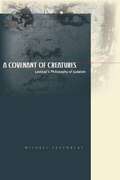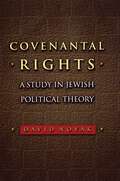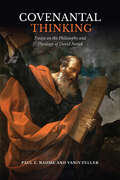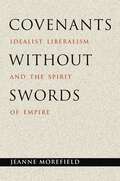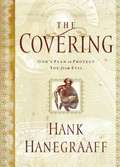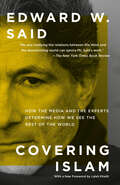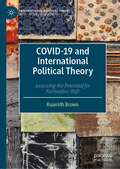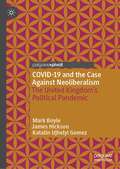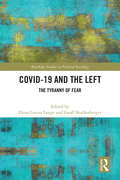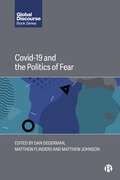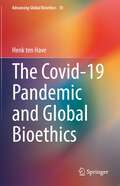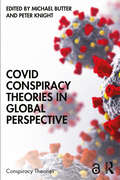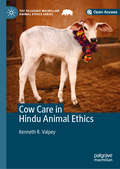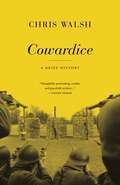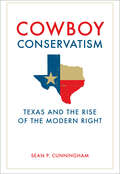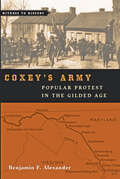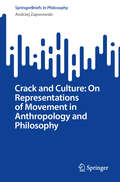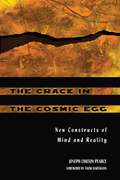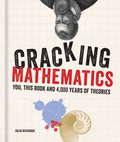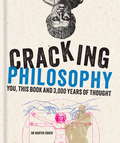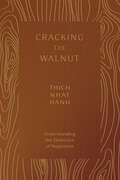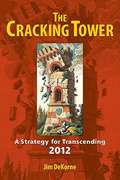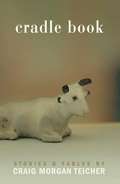- Table View
- List View
A Covenant of Creatures: Levinas's Philosophy of Judaism
by Michael Fagenblat"I am not a particularly Jewish thinker," said Emmanuel Levinas, "I am just a thinker." This book argues against the idea, affirmed by Levinas himself, that Totality and Infinity and Otherwise Than Being separate philosophy from Judaism. By reading Levinas's philosophical works through the prism of Judaic texts and ideas, Michael Fagenblat argues that what Levinas called "ethics" is as much a hermeneutical product wrought from the Judaic heritage as a series of phenomenological observations. Decoding the Levinas's philosophy of Judaism within a Heideggerian and Pauline framework, Fagenblat uses biblical, rabbinic, and Maimonidean texts to provide sustained interpretations of the philosopher's work. Ultimately he calls for a reconsideration of the relation between tradition and philosophy, and of the meaning of faith after the death of epistemology.
Covenantal Rights: A Study in Jewish Political Theory (New Forum Books #20)
by David NovakCovenantal Rights is a groundbreaking work of political theory: a comprehensive, philosophically sophisticated attempt to bring insights from the Jewish political tradition into current political and legal debates about rights and to bring rights discourse more fully into Jewish thought. David Novak pursues these aims by presenting a theory of rights founded on the covenant between God and the Jewish people as that covenant is constituted by Scripture and the rabbinic tradition. In doing so, he presents a powerful challenge to prevailing liberal and conservative positions on rights and duties and opens a new chapter in contemporary Jewish political thinking. For Novak, "covenantal rights" are rooted in God's primary rights as creator of the universe and as the elector of a particular community whose members relate to this God as their sovereign. The subsequent rights of individuals and communities flow from God's covenantal promises, which function as irrevocable entitlements. This presents a sharp contrast to the liberal tradition, in which rights flow above all from individuals. It also challenges the conservative idea that duties can take precedence over rights, since Novak argues that there are no covenantal duties that are not backed by correlative rights. Novak explains carefully and clearly how this theory of covenantal rights fits into Jewish tradition and applies to the relationships among God, the covenanted community, and individuals. This work is a profound and provocative contribution to contemporary religious and political theory.
Covenantal Thinking: Essays on the Philosophy and Theology of David Novak (The Kenneth Michael Tanenbaum Series in Jewish Studies)
by Paul E. Nahme Yaniv FellerThe philosophy and theology of David Novak, one of the most prominent and creative contemporary Jewish thinkers, grapples with Judaism, Christian theology, the tradition of natural law, and the Western philosophical canon. Never shying away from contested ethical and religious themes, Novak’s original insights and intellectual spirit have spanned voluminous publications and inspired Jewish, Christian, and Muslim thinkers to engage concepts such as religious liberty, covenantal morality, and the importance of theological reasoning. Written primarily by scholars in the field of Jewish thought, Covenantal Thinking is a collection of essays dedicated to Novak’s work. The book examines topics such as election, natural law, Jewish political thought, Zionism, and the relation between reason and revelation. This collection is unique because it includes Novak’s replies to his critics, including his clarifications of his philosophical and theological positions. Offering a vital contribution to contemporary Jewish thought, Covenantal Thinking illuminates Novak’s contributions as a scholar who trained, conversed with, and inspired the next generation of philosophical theologians.
Covenants without Swords: Idealist Liberalism and the Spirit of Empire
by Jeanne MorefieldCovenants without Swords examines an enduring tension within liberal theory: that between many liberals' professed commitment to universal equality on the one hand, and their historic support for the politics of hierarchy and empire on the other. It does so by examining the work of two extremely influential British liberals and internationalists, Gilbert Murray and Alfred Zimmern. Jeanne Morefield mounts a forceful challenge to disciplinary boundaries by arguing that this tension, on both the domestic and international levels, is best understood as frequently arising from the same, liberal reformist political aim—namely, the aim of fashioning a socially conscious liberalism that ultimately reifies putatively natural, preliberal notions of paternalistic order.Morefield also questions conventional analyses of interwar thought by resurrecting the work of Murray and Zimmern, and by linking their approaches to liberal internationalism with the ossified notion of sovereignty that continues to trouble international politics to this day. Ultimately, Morefield argues, these two thinkers' drift toward conservative and imperialist understandings of international order was the result of a more general difficulty still faced by liberals today: how to adequately define community in liberal terms without sacrificing these terms themselves. Moreover, Covenants without Swords suggests that Murray and Zimmern's work offers a cautionary historical example for the cadre of post-September 11th "new imperialists" who believe it possible to combine a liberal commitment to equality with an American Empire.
The Covering
by Hank HanegraaffIn a world where evil seems to lurk around every corner and our thoughts turn to worry about our safety and security, the armor of God is our Father's protection in the fight against evils of our temporary home. Best-selling author Hank Hanegraaff describes God's protective covering over his children by dissecting Paul's words in Ephesians 6: 10-18 commanding us to put on the armor of God and "take our stand against the devil's schemes." Hanegraaff moves through the passage, phrase by phrase, defining God's armor, explaining what it means to embrace God's covering, and the practical ways God delivers us from evil.
Covering Islam: How the Media and the Experts Determine How We See the Rest of the World
by Edward W. SaidIn this classic work, the author of Culture and Imperialism reveals the hidden agendas and distortions of fact that underlie even the most "objective" coverage of the Islamic world."No one stuyding the relations between the West and the decolonizing world can ignore Mr. Said's work." --The New York Times Book ReviewFrom the Iranian hostage crisis through the Gulf War and the bombing of the World Trade Center, the American news media have portrayed "Islam" as a monolithic entity, synonymous with terrorism and religious hysteria. At the same time, Islamic countries use "Islam" to justify unrepresentative and often repressive regimes. Combining political commentary with literary criticism, Covering Islam continues Edward Said's lifelong investigation of the ways in which language not only describes but also defines political reality.
COVID-19 and International Political Theory: Assessing the Potential for Normative Shift (International Political Theory)
by Ruairidh BrownThe COVID-19 pandemic is an international event whose impact has been acutely felt by almost everyone across the globe. Indeed, currently reading this, it is highly unlikely that your own life has not been significantly impacted by COVID-19. This book offers one of the first analysis of the COVID-19 pandemic and its potential impact from the perspective of International Political Theory. It promises normative interpretation and analysis of the COVID-19 pandemic and to map potential political orders that may emerge in the post-pandemic world. It seeks to give initial insight into how the shockwaves from this event will impact upon our political and international norms. The book focuses on the normative questions of: can emergency powers be used to preserve society from the virus without necessitating a transition to more authoritarian political norms? Will COVID-19 prove a catalyst for Chinese Socialism to challenge, and potentially usurp, liberalism as the dominant international political norm? What changes to liberalism ought to be made as a result of the pandemic? What direction should liberalism take in the post-pandemic world?
COVID-19 and the Case Against Neoliberalism: The United Kingdom’s Political Pandemic
by Mark Boyle James Hickson Katalin Ujhelyi GomezThis book seeks to better understand the meaning and implications of the UKs calamitous encounter with the COVID-19 global pandemic for the future of British neoliberalism. Construing COVID-19 as a political pandemic and mobilising a novel applied political philosophy approach, the authors cultivate fresh intellectual resources, both analytical and normative, to better understand why the UK failed the COVID-19 test and how it might ‘fail forward’ so as to strengthen its resilience. COVID-19 they argue, has intercepted the UK government’s decades-long experimentation with neoliberalism at what appears to be a threshold moment in this model’s life course. Neoliberalism has served as a key progenitor of the country’s vulnerability: the pandemic has cruelly unveiled the failings of neoliberal logics and legacies which have placed the country at elevated risk and hampered its response. The pandemic in turn has attenuated underlying systemic maladies inherent in British neoliberalism and served as a great disruptor and potential accelerant of history; a consequential episode in the tumultuous life of this politico-economic model. To meaningfully ‘build back better’, a true renaissance of social democracy is needed. Drawing upon the neorepublican tradition of political philosophy, the authors confront neoliberalism’s hegemonic but parochial concept of human freedom as non-interference and place the neorepublican idea of freedom as non-domination in the service of building a new UK social contract. This book will be of interest to political philosophers, political geographers, medical sociologists, public-health scholars, and epidemiologists, to stakeholders engaged in the public inquiry processes now gathering momentum globally and to architects of build back better programmes, especially in western advanced capitalist economies.
COVID-19 and the Left: The Tyranny of Fear (Routledge Studies in Political Sociology)
by Elena Louisa Lange Geoff ShullenbergerThe COVID-19 pandemic and the measures introduced to purportedly contain its spread have wrought an unprecedented global social transformation.Authoritarian measures such as lockdowns, vaccine mandates, and the enforced wearing of facemasks, have led to a biopolitical disenfranchisement of human rights and the encroachment of state and corporate directives onto private lives. By supporting these measures, the left has lost sight of its traditional critique of capital, the state, and class society and has instead reinforced existing power structures in the name of ‘saving lives’. In doing so, the left has contributed to widespread suffering, especially among the ‘vulnerable’ groups in society the measures claimed to protect, particularly children, the elderly, and the poor.COVID-19 and the Left explores why the left has departed from its self-understanding as a critical force against state power, unfettered capital accumulation, the digital transformation, biopolitics, and a politics of social discrimination, and instead has largely assumed a stance in line with the neoliberal consensus. In particular, the essays in this collection explore the role of fear, panic, and psychological blackmailing as a tool of domination in late capitalist society and consider whether the left has been a victim, or an active perpetrator, of a ‘tyranny of fear’.Drawing upon approaches from various disciplines and interrogating shibboleths on the left and right, the essays in this volume consider the ideological, sociocultural, and economic implications of the historical rupture that the COVID-19 pandemic presents and instead argue for a counter-narrative to fear and its harmful consequences. This provocative collection will be of considerable interest to those with an interest in the contemporary left and the impact of the COVID-19 pandemic.
COVID-19 and the Politics of Fear (Global Discourse)
by Dan Degerman, Matthew Flinders and Matthew JohnsonThe COVID-19 pandemic thrust fear into the heart of political debate and policy making. In the wake of the pandemic, it is critical to clarify the role of fear in these processes to avoid repeating past mistakes and to learn crucial lessons for future crises. This book draws on case studies from across the world, including the UK, Turkey, Brazil and the US, to provide thought-provoking and practical insights into how fear and related emotions can shape politics under extraordinary and ordinary circumstances. Offering interdisciplinary perspectives from leading and emerging scholars in politics, philosophy, sociology and anthropology, the book enables a better understanding of post-pandemic politics for students, researchers and policy makers alike.
The Covid-19 Pandemic and Global Bioethics (Advancing Global Bioethics #18)
by Henk ten HaveThis book demonstrates that the COVID 19 pandemic asks for a a global approach to bioethics. it describes how the pandemic affects the experience of being in a world that is intrinsically characterized by global connectivity. It demonstrates that a moral vision is necessary to articulate this experience of connectedness. Subsequently, a perspective of global bioethics is introduced, which provides a broader framework than mainstream bioethics, since it highlights the significance of both vulnerability and solidarity. Through a unique global perspective the book addresses the moral challenges of the pandemic, and places the confrontation with death, disease and disability within a wider framework of ethical concerns. This book is of important in the public debate on infectious diseases, and of relevance to health professionals, global health educators, public health experts,as well as policy makers.
Covid Conspiracy Theories in Global Perspective (Conspiracy Theories)
by Michael Butter Peter KnightCovid Conspiracy Theories in Global Perspective examines how conspiracy theories and related forms of misinformation and disinformation about the Covid-19 pandemic have circulated widely around the world.Covid conspiracy theories have attracted considerable attention from researchers, journalists, and politicians, not least because conspiracy beliefs have the potential to negatively affect adherence to public health measures. While most of this focus has been on the United States and Western Europe, this collection provides a unique global perspective on the emergence and development of conspiracy theories through a series of case studies. The chapters have been commissioned by recognized experts on area studies and conspiracy theories.The chapters present case studies on how Covid conspiracism has played out (some focused on a single country, others on regions), using a range of methods from a variety of disciplinary perspectives, including history, politics, sociology, anthropology, and psychology. Collectively, the authors reveal that, although there are many narratives that have spread virally, they have been adapted for different uses and take on different meanings in local contexts.This volume makes an important contribution to the rapidly expanding field of academic conspiracy theory studies, as well as being of interest to those working in the media, regulatory agencies, and civil society organizations, who seek to better understand the problem of how and why conspiracy theories spread. The Open Access version of this book, available at www.taylorfrancis.com, has been made available under a Creative Commons Attribution-Non Commercial-No Derivatives 4.0 license.
Cow Care in Hindu Animal Ethics (The Palgrave Macmillan Animal Ethics Series)
by Kenneth R. ValpeyThis open access book provides both a broad perspective and a focused examination of cow care as a subject of widespread ethical concern in India, and increasingly in other parts of the world. In the face of what has persisted as a highly charged political issue over cow protection in India, intellectual space must be made to bring the wealth of Indian traditional ethical discourse to bear on the realities of current human-animal relationships, particularly those of humans with cows. Dharma, yoga, and bhakti paradigms serve as starting points for bringing Hindu—particularly Vaishnava Hindu—animal ethics into conversation with contemporary Western animal ethics. The author argues that a culture of bhakti—the inclusive, empathetic practice of spirituality centered in Krishna as the beloved cowherd of Vraja—can complement recently developed ethics-of-care thinking to create a solid basis for sustaining all kinds of cow care communities.
Cowardice: A Brief History
by Chris WalshA provocative look at how cowardice has been understood from ancient times to the presentCoward. It's a grave insult, likely to provoke anger, shame, even violence. But what exactly is cowardice? When terrorists are called cowards, does it mean the same as when the term is applied to soldiers? And what, if anything, does cowardice have to do with the rest of us? Bringing together sources from court-martial cases to literary and film classics such as Dante's Inferno, The Red Badge of Courage, and The Thin Red Line, Cowardice recounts the great harm that both cowards and the fear of seeming cowardly have done, and traces the idea of cowardice’s power to its evolutionary roots. But Chris Walsh also shows that this power has faded, most dramatically on the battlefield. Misconduct that earlier might have been punished as cowardice has more recently often been treated medically, as an adverse reaction to trauma, and Walsh explores a parallel therapeutic shift that reaches beyond war, into the realms of politics, crime, philosophy, religion, and love.Yet, as Walsh indicates, the therapeutic has not altogether triumphed—contempt for cowardice endures, and he argues that such contempt can be a good thing. Courage attracts much more of our attention, but rigorously understanding cowardice may be more morally useful, for it requires us to think critically about our duties and our fears, and it helps us to act ethically when fear and duty conflict.Richly illustrated and filled with fascinating stories and insights, Cowardice is the first sustained analysis of a neglected but profound and pervasive feature of human experience.
Cowboy Conservatism: Texas and the Rise of the Modern Right (New Directions In Southern History Ser.)
by Sean P. Cunningham“Cunningham provides a vivid, informative, and frequently insightful chronicle of Texas politics between 1963 and 1980.” —Journal of American HistoryDuring the 1960s and 1970s, Texas was transformed by a series of political transitions. After more than a century of Democratic politics, the state became a Republican stronghold virtually overnight, and by 1980, it was known as “Reagan Country.” Ultimately, Republicans dominated the Texas political landscape, holding all twenty-seven of its elected offices and carrying former governor George W. Bush to his second term as president with more than 61 percent of the Texas vote.In Cowboy Conservatism, Sean P. Cunningham examines the remarkable origins of Republican Texas. Utilizing extensive research drawn from the archives of four presidential libraries, gubernatorial papers, local campaign offices, and oral histories, Cunningham presents a compelling narrative of modern conservatism as it evolved in one of the nation’s largest and most politically important states.Cunningham analyzes the political changes that took place in Texas during the tumultuous seventeen-year period between John F. Kennedy’s assassination and the election of Ronald Reagan. He explores critical issues related to the changing political scene in Texas, including the emergence of “law and order,” race relations and civil rights, the slumping economy, the Vietnam War, and the rise of a politically active Christian Right, as well as the role of iconic politicians such as Ronald Reagan, Jimmy Carter, John Connally, and John Tower.Cowboy Conservatism demonstrates Texas’s distinctive and vital contributions to the transformation of postwar American politics, revealing a vivid portrait of modern conservatism in one of the nation’s most fervent Republican strongholds.
Coxey's Army: Popular Protest in the Gilded Age (Witness to History)
by Benjamin F. AlexanderA colorful study of the nineteenth century march on Washington, the man who led it, and the national sensation that prefigured the New Deal.In 1893, America was suffering a serious economic depression. Fed up with government inactivity, Populist agitator Jacob S. Coxey led hundreds of unemployed laborers on a march from Massillon, Ohio, to Washington, D.C. Their intention was to present a “petition in boots” for government-financed jobs building and repairing the nation’s roads. On May 1, the Coxeyites descended on the center of government, where a melee ensued between them and the police. Soon, other Coxey-inspired contingents were on their way east from places as far away as San Francisco and Portland. Some even hijacked trains along the way.In Coxey’s Army, Benjamin F. Alexander brings Coxey and his fellow leaders to life, along with the reporters and spies who traveled with them and the captivated readers who followed the story in the newspapers. Alexander explains how the Coxeyite demands fit into a larger history of economic theory and the labor movement. Despite running a gauntlet of ridicule, the marchers laid down a rough outline of what emerged decades later as the New Deal.
Crack and Culture: On Representations of Movement in Anthropology and Philosophy (SpringerBriefs in Philosophy)
by Andrzej ZaporowskiThis book analyzes the representations of movement that reflect time. The author scrutinizes movement critically assuming that (1) movement is composed of change, (2) a change may be a crack, (3) the crack demonstrates a disturbance in the experienced movement, and (4) it is culture that is a remedy to the crisis caused by this disturbance. It is shown that artistic sensitivity allows for the detection of various cracks, and it is, among other examples, religious mythology and scientific narratives where one finds a multiplicity of representations to manage the consequences of this detection. Zaporowski sees these tools as purposefully constructed to respond to the human experience of discontinuity in the world and proposes to frame time cyclically while – critically – paying attention to the cracks as significant indicators that force one to amend one’s conduct in an ordered fashion. He appeals to the notion of culture, which allows one to manage the cracked nature of movement. Culture conditions one’s purposeful and ordered actions, and is subject to possible reconfigurations through a series of interactions. It allows for foreseeable conduct while at the same time being aware of possible and irreversible changes. This volume appeals to researchers, as well as undergraduate and graduate students in philosophy and anthropology.
The Crack in the Cosmic Egg: New Constructs of Mind and Reality
by Joseph Chilton Pearce Thom HartmannThe classic work that shaped the thought of a generation with its powerful insights into the true nature of mind and reality. • Defines culture as a "cosmic egg" structured by the mind's drive for logical ordering of its universe. • Provides techniques allowing individuals to break through the vicious circle of logic-based systems to attain expanded ways of creative living and learning. The sum total of our notions of what the world is--and what we perceive its full potential to be--form a shell of rational thought in which we reside. This logical universe creates a vicious circle of reasoning that robs our minds of power and prevents us from reaching our true potential. To step beyond that circle requires a centering and focus that today's society assaults on every level. Through the insights of Teilhard, Tillich, Jung, Jesus, Carlos Castaneda, and others, Joseph Chilton Pearce provides a mode of thinking through which imagination can escape the mundane shell of current construct reality and leap into a new phase of human evolution. This enormously popular New Age classic is finally available again to challenge the assumptions of a new generation of readers and help them develop their potential through new creative modes of thinking. With a masterful synthesis of recent discoveries in physics, biology, and psychology, Pearce reveals the extraordinary relationship of mind and reality and nature's blueprint for a self-transcending humanity.
Cracking Mathematics: You, this book and 4,000 years of theories
by Colin BeveridgeThis comprehensive guide covers the history and development of mathematics, from the Ancient Egyptians and Pythagoreans to key figures such as Galileo, Dodgson, Babbage and Lovelace through to contemporary work of the 21st century. It tells of the remarkable stories that have shaped mathematics and also features sections on how maths can be used to solve the mysteries of the universe, what the Prisoner's Dilemma is as well as Fermat's Last Theorem amongst many more.Accessible, well-informed and fully-illustrated, this is a book that shows perfectly just how varied and fascinating mathematics is as a subject.
Cracking Philosophy
by Martin CohenThis guide covers the main schools of thought from the Ancient Chinese philosophies of Confucius and Lao Tzu, Ancient wisdom from Aristotle, Plato, Zeno and Pythagoras through to those most influential of philosophers studied the world over - Hegel, Marx, Descartes, Kant, Kierkegaard and Wittgenstein to name but a few. It also discusses the big questions such as 'What is truth?', the relationship between philosophy and religion and the problem of morality..Accessible, well-informed and fully-illustrated, this is a wonderful book for anyone who is keen to know more about the history of philosophers and their theories.
Cracking Philosophy
by Martin CohenThis guide covers the main schools of thought from the Ancient Chinese philosophies of Confucius and Lao Tzu, Ancient wisdom from Aristotle, Plato, Zeno and Pythagoras through to those most influential of philosophers studied the world over - Hegel, Marx, Descartes, Kant, Kierkegaard and Wittgenstein to name but a few. It also discusses the big questions such as 'What is truth?', the relationship between philosophy and religion and the problem of morality.Accessible, well-informed and fully-illustrated, this is a wonderful book for anyone who is keen to know more about the history of philosophers and their theories.
Cracking the Walnut: Understanding the Dialectics of Nagarjuna
by Thich Nhat HanhZen Master Thich Nhat Hanh's commentary on Nagarjuna's Treatise on the Middle Way, one of the most famous Buddhist texts in existenceNagarjuna is a giant in the Buddhist canon, thought to be the greatest Buddhist philosopher after the Buddha. He lived in southern India in the 2nd century CE.Cracking the Walnut contains the text of Nagarjuna&’s Treatise on the Middle Way (Mulamadhyamakakarika), defending the essential premise that all things have the nature of emptiness, they have no self-nature, but are in a constant process of change and interrelationship with one another.Weaving Nagarjuna&’s text with commentary by Thich Nhat Hanh, taken from talks given at two 3-month-long retreats, helps us bring these teachings into our daily life. They are strong teachings, designed to break through all metaphysical speculation. To a greater or lesser extent, we all have notions and ideas about life. Sometimes our ideas can contribute to the advancement of humanity, but the problem comes when we are caught in our ideas and believe them to be the absolute truth. When people believe that something is the absolute truth, they may be ready to fight, kill, or die for it. This brings about polarization, deep division, and suffering in ourselves, our society, community, and family. This is not the way ahead for humanity. This book helps us let go of our ideas and go in the direction of understanding and compassion.
The Cracking Tower: A Strategy for Transcending 2012
by Jim Dekorne"One needn't ingest psychedelics, be a shaman, or believe in prophecy to see that countless environmental and social imbalances are about to converge into an inevitable 'perfect storm' at some time in the very near future. 'Singularity' is a word that means 'exponential change,' and whether or not you accept the 2012 prophecy, it is certain that you are already reeling under the accelerating techno-socio-ecological transformations now altering our reality. This crisis is clearly in process, regardless of what date one picks for its culmination. To acknowledge this is not the same as believing that space aliens will whisk us home in a UFO-there are too many synchronicities here to ignore. Despite the abysmal track record of apocalypse prediction, this is one end-of-the-world 'prophecy' that is actually coming true: by any standard of measurement, our old familiar world is disappearing forever-it just has a bit further to go before trends already in process fulfill themselves. "
Cradle Book (American Readers Series)
by Craig Morgan TeicherTimeless yet timely and hopeful with a dark underbelly, these fables revive a tradition running from Aesop to W.S. Merwin. With a poet&’s mastery, Craig Morgan Teicher creates strange worlds populated by animals fated for disaster and the people who interact with them, or simply act like them, including a very sad boy who wishes he had been raised by wolves. There are also a handful of badly behaving gods, a talking tree, and a shape-shifting room.Craig Morgan Teicher is poetry editor of Publishers Weekly and a vice president on the board of the National Book Critics Circle. He lives in Brooklyn, New York.
Cradle Book
by Craig Morgan TeicherTimeless yet timely and hopeful with a dark underbelly, these fables revive a tradition running from Aesop to W.S. Merwin. With a poet's mastery, Craig Morgan Teicher creates strange worlds populated by animals fated for disaster and the people who interact with them, or simply act like them, including a very sad boy who wishes he had been raised by wolves. There are also a handful of badly behaving gods, a talking tree, and a shape-shifting room.Craig Morgan Teicher is poetry editor of Publishers Weekly and a vice president on the board of the National Book Critics Circle. He lives in Brooklyn, New York.
